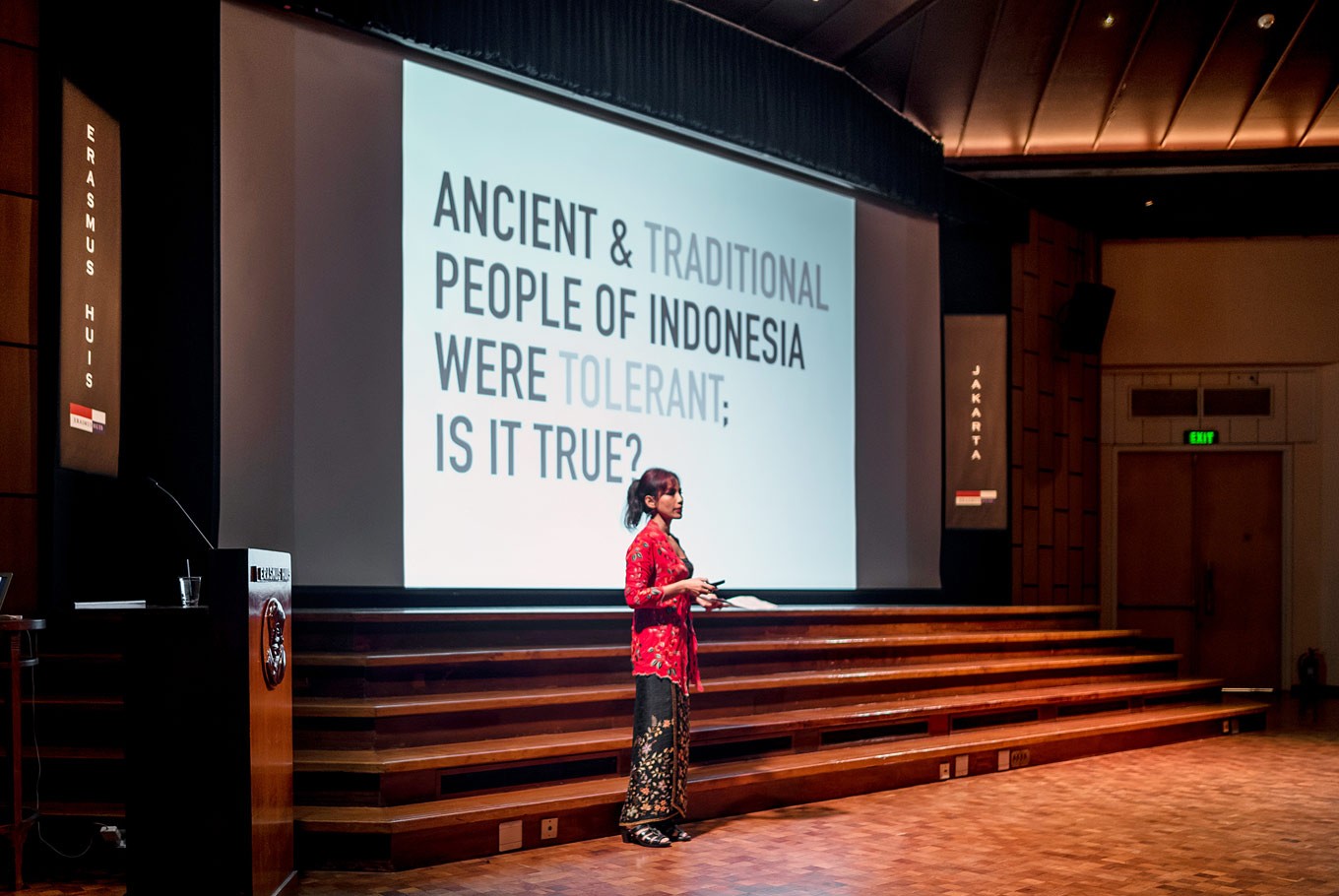Popular Reads
Top Results
Can't find what you're looking for?
View all search resultsPopular Reads
Top Results
Can't find what you're looking for?
View all search resultsA touch of rasa to cure intolerance
In a social climate that is becoming increasingly more intolerant, one is left to wonder what happened to the appreciation of diversity that Indonesia was once known for.
Change text size
Gift Premium Articles
to Anyone
I
n the years following reformation, when the yoke of dictatorial oppression was shed in favor of a democratic system, instances of intolerant behavior have curiously seen a rapid rise in frequency.
During a recent lecture hosted by the Indonesian Heritage Society at Erasmus Huis in Kuningan, South Jakarta, the award-winning author Ayu Utami dived into the country’s history to find where the root of intolerance lay.
“Intolerance is a modern phenomenon in Indonesia,” Ayu said.
“It is known in Indonesia history only after the introduction of monotheism and modernity.”
She continued to specify that monotheism in Indonesian predominantly concerned Islam, considering the widespread adherence to the religion throughout the archipelago. Modernity she defined as the spirit of the age following the Renaissance, which was introduced to Indonesia through colonialism and instilled a mechanism of control through division and categorization.
“Curiously, it is after the entrance of Islam and western modernity that intolerant incidents started to be seen in Indonesia,” she said.
Ayu said from the 16th century onward, multiple Javanese texts began mentioning cases of heresy, which were not there before and seem to be linked to monotheism. Before the modern period, the ancient Javanese also dealt with religious differences, but maintained peace through religious syncretism and synthesis. These processes amalgamate different aspects of different religions to overcome friction.
A notable example of the process of combining different beliefs discussed in the lecture was Candi Jawi, built during the 13th century Singhasari kingdom of East Java. The design of the Hindu-Buddhist temple combines elements typical of both those religions, which can still be witnessed today.
However, blaming monotheism as the sole culprit for the rise in intolerance would be too simple as secularism could be just as intolerant, Ayu said. She found that the root cause of intolerance was actually a clash between the two value systems of monotheism and modernity, which shared the same underlying mechanism of reason, with its drive towards categorization and division.
“Intolerance is the expression of the legal obsessed mind. Because you’re obsessed with division, distinction, and categorization, you became intolerant.
“Both the religious and the secular are no different in the sense that they are obsessed with legal systems. Nobody is fighting to be free from any legalization.”
Rasa vs Reason
According to Ayu, before the mechanism of reason, and the intolerance it brought, took over, the mechanism of rasa was dominant in Java. She defined the concept of rasa as “the non-divisive mechanism through which we understand the presence of others and connect or even unite with them.”
This mechanism of rasa practiced tolerance by building more on tradition and practice, resulting in examples of syncretism like the Candi Jawi, whereas the mechanism of reason builds on a theoretical system and the dogmatism it brings forth. The mechanism of rasa does not know the need to categorize anything and everything, which is characteristic of the mechanism of reason.
The problem of intolerance has been exacerbated by the rise of social media in the past decade, because it has steered people further from critical thinking and closer toward relying on simple dogmas. The internet has opened the floodgates for an overwhelming amount of information, without equipping the public with tools to keep their heads above water. Ironically, people now have access to more information than ever, but lack the mental software to digest it all.
“If you don’t have the mental software, you will probably be ruled by your sentiments and resentments, or dogmas. [With] dogmas it’s easy to give you a feeling of understanding because it’s easy: with dogmas you just accept.”
In the online sphere, traditional media are increasingly bowing down to the level of social media, as the new revenue systems supporting them depend increasingly more on the maximum amount of hits one can acquire. They now produce more and more sensationalist news, with titles and content aimed at getting clicks.
“The press, which used to be considered the fourth pillar of democracy, has lost its independence, not because of government censorship, but because of the censorship of the audience,” Ayu said, commenting on the media’s adjustment of their output to fit the tastes of their audience.
Ayu said the way out was for society to again find a balance between the mechanisms of reason and rasa. The mechanism of rasa could teach fluidity to a society that is based on rigid categorization and legalization. However, in order to do so, some changes will have to be made.
“We have to change the way religion is taught. At school as well as in our congregations,” Ayu said.
“The way religion is taught really puts forth intolerance. [It is] divisive and also dogmatic. We have lost the spiritual experience in experiencing religion. Nowadays it’s no longer an experience but dogmas. It is taught through schools, universities, religious groups, through the mosque, and that is I think one of the biggest problems here.”
Ayu believes that religion should be taught in a new way that is critical and spiritual.
“And for those who are agnostic or secular or atheist, don’t ridicule the religious or spiritual because it won’t help us escape from this situation.”











